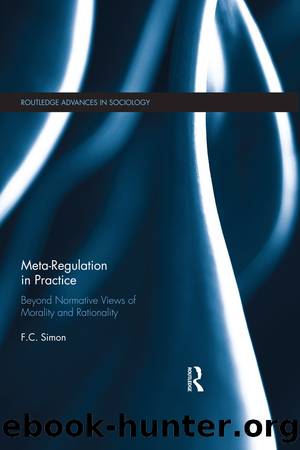Meta-Regulation in Practice by F.C. Simon

Author:F.C. Simon [Simon, F.C.]
Language: eng
Format: epub
Tags: Social Science, General, Sociology
ISBN: 9781315308890
Google: QTElDwAAQBAJ
Publisher: Routledge
Published: 2017-06-26T04:32:33+00:00
Legislative changes in 2004
Although the Victorian ESC and the Retail Code were generally well regarded by low-income consumer advocacy groups, many advocates remained concerned about the possibilities for vulnerable customers to be mistreated by energy retailers. This concern was amplified when the ESC released a draft decision in January 2004 (ESC, 2004b) to allow late payment fees for consumers who had the capacity to pay their bills. The consumer groups responded very strongly against this (for example, Consumer Law Centre Victoria, 2004; Consumer Utilities Advocacy Centre (CUAC), 2004; Victorian Council of Social Service, 2004a), and the then Energy Minister also submitted a letter to the consultation process asking the ESC to reconsider this move (Theophanous, 2004). This was when the ESC started to lose the support of the low-income consumer advocacy groups.
The year 2004 was also when the sunset date approached for both price regulation and the application of the Retail Code. Although the government had shown no desire to remove the Retail Code (and the issue had never been raised as a genuine possibility), the two elements of price and non-price consumer protection had been combined in legislative drafting as the energy retail âsafety netâ, and the safety net was scheduled to cease at the end of 2004. However, the government was able to extend the safety net beyond this date, and so had a decision to make. The ESC carried out a review of the effectiveness of competition as input to the governmentâs decision, triggering concern for the low-income consumer advocacy groups that the ESC would find competition to be effective and so recommend ending price regulation and perhaps even the application of the Retail Code. The ESCâs (2004c) finding in June was that competition was generally effective, and it suggested a reduction in the coverage of price regulation to only cover residential customers below a certain consumption threshold. The ESC also suggested a lower customer consumption threshold for the application of the Retail Code. Further, it suggested that the substance of the Retail Code might eventually shift into the jurisdiction of Victoriaâs more generic consumer affairs regulator â a suggestion that would have alarmed the low-income consumer advocates, who saw the existing Retail Code and an energy-focused regulator as vital.
It was in this environment of low-income consumer advocate anxiety about ESC decision-making that issues related to customers in financial hardship came to a head. In mid-2004 consumer advocates and EWOV lobbied the ESC and government to take action to address increased disconnection rates. The regulator responded by carrying out a special report into disconnections, where it found no issue:
Neither the Commissionâs performance data on disconnections, instalment plans and affordability complaints, nor the results of its independent audits of retailer compliance with the code, provide evidence of systematic disconnection of financially vulnerable customers by energy retailers. On the contrary, the Commissionâs independent audits confirm that energy retailers had a high level of compliance with their Code obligations.
(ESC, 2004a: 2)
Download
This site does not store any files on its server. We only index and link to content provided by other sites. Please contact the content providers to delete copyright contents if any and email us, we'll remove relevant links or contents immediately.
| Air & Space | Construction |
| Disability | Educational Law & Legislation |
| Labor Law | Maritime |
| Military | Personal Injury |
| Sports |
Steroids: History, Science, and Issues by Standora Joan E.; Bogomolnik Alex; Slugocki Malgorzata(1192)
A Practical Guide to International Arbitration in London by Hilary Heilbron(1081)
Adrift by Steven Callahan(1030)
Reclaiming History by Vincent Bugliosi(1018)
Persuasion by Owner(1012)
The Nuremberg Interviews by Leon Goldensohn(988)
Dog Company: A True Story of American Soldiers Abandoned by Their High Command by Lynn Vincent & Roger Hill(978)
40 Days and 40 Nights by Matthew Chapman(966)
Poisoned by Jeff Benedict(958)
Last Narco by Beith Malcolm(936)
The New Whistleblower's Handbook by Stephen Kohn(921)
Introduction to the study and practice of law in a nutshell by Kenney F. Hegland(894)
Kafka's Last Trial by Benjamin Balint(846)
Lincoln's Code by John Fabian Witt(840)
A Passing Fury by A. T. Williams(825)
Japanese War Crimes during World War II: Atrocity and the Psychology of Collective Violence by Frank Jacob(809)
Eichmann in Jerusalem by Hannah Arendt(797)
Dog Company: A True Story of American Soldiers Abandoned by Their High Command by Roger Hill & Lynn Vincent(794)
A Court of Refuge by Ginger Lerner-Wren & Rebecca A. Eckland(785)
